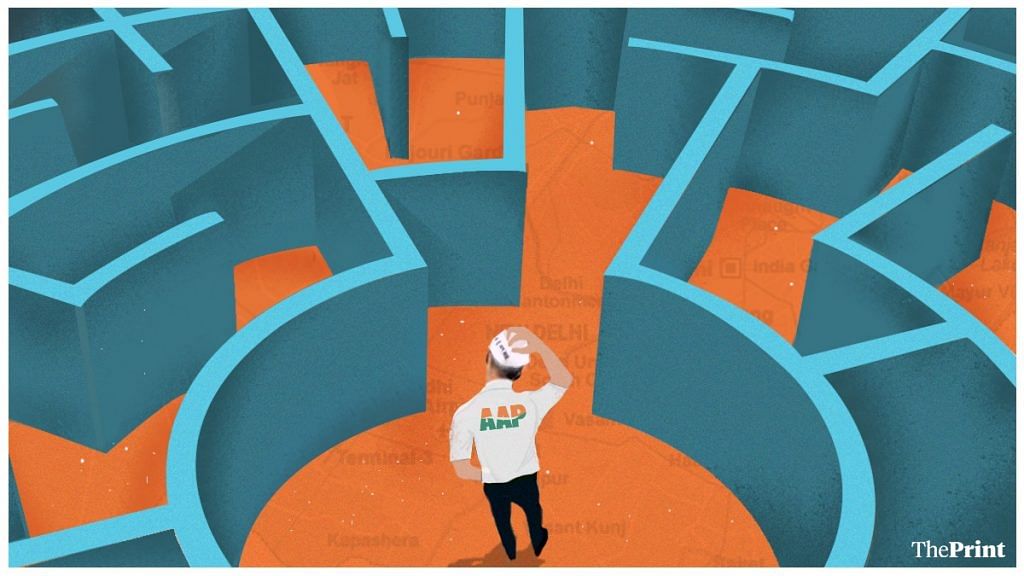In trying to be the better ‘Hindu politician’, which the Aam Admi Party convener perhaps thought was a masterstroke, Arvind Kejriwal has been cut to pieces through the new GNCTD Bill, politically. The BJP has hit AAP on its Achilles heel. The Delhi government is rendered useless even though Kejriwal had elevated it to an ideal model of governance by calling it “the Delhi model”. Evidently, under Prime Minister Narendra Modi and Home Minister Amit Shah, only the “Gujarat model” can exist.
Arvind Kejriwal and his Aam Admi Party appear incorrigible. Call them self-absorbed or simply blind, but they seem to understand that only what they think is brilliant, while everyone else is an idiot.
As political observers, many of us had commented in the past on Kejriwal treading a slippery slope when he started flirting with Hindutva to launch himself nationally. He’s clearly setting himself up as a viable political alternative to Narendra Modi. And truth be told, Kejriwal is clearly a winning alternative. But his sudden change of personality, of trying to go down the Hindutva road, instead of sticking to the good-governance plank, has been, perhaps, the single-biggest mistake of his political career.
In my article two weeks ago, after Kejriwal announced the “deshbhakti budget”, I had said that the Delhi CM will inevitably end up being the loser if he tries playing the same game as Narendra Modi and Yogi Adityanath, because the latter are heavyweights in this category. And so it has come to pass.
Also read: AAP govt cut to size but Delhi can progress with a revamped, empowered municipal corporation
The ‘aam admi’ was working for Kejriwal
If pattern in politics is anything to go by, Kejriwal was left pretty much untouched by the BJP whenever he attacked Modi and the party with his verbose, acerbic comments. The Delhi CM sounded like an ‘aam admi’ or common man, who didn’t use political jargon, making his criticism of the PM very effective. And the BJP couldn’t do much about it because then, any frontal attack on Kejriwal would have made its political vendetta obvious. The message that would have gone out would have been of an all-powerful Modi troubling an ‘aam admi’ who had the guts to speak against him.
Also read: Govt insecure as Kejriwal emerging as alternative to Modi: Sisodia criticising GNCTD bill
The Hindutva tilt
But after Modi came back to power in 2019, Kejriwal changed his tack. The Delhi CM went with a bouquet of flowers to greet the PM on his return; went soft on Amit Shah and let him take charge of the Covid situation when the national capital was reeling under high caseload. In the run up to the 2019 Lok Sabha election, Kejriwal had appealed not to bring back the BJP to power — “what would happen to the country with a Home Minister like Amit Shah,” the Delhi CM had warned.
Of course, the bouquet of flowers and co-operative federalism seems all statesmanlike, and should ideally be encouraged in a democratic set up. But we don’t live in the times of statesmanship. We are living in the times of cut-throat politics where backstabbing and horse trading are the norms. And Kejriwal, in his attempt to appease the centre, has ended up giving the BJP an upper-hand.
The GNCTD Bill has, effectively, rendered the Delhi government toothless because it clearly states that any reference to “government” in Delhi shall mean the “lieutenant governor”. The tug of war between the L-G and Delhi government is nothing new. But the 2018 Supreme Court verdict had put an end to this tussle, and broadly in favour of the Delhi government. The Supreme Court had clearly told the Delhi government that it did not need to consult the L-G of Delhi on day-to-day matters. The GNCTD Bill makes the Supreme Court verdict null and void, which is why many in the Opposition are calling it unconstitutional. The centre has ensured that the elected government of Delhi cannot govern the city-state because no matter which policies or laws it introduces, they cannot come into effect without the L-G’s permission. So, practically, it is the LG who is now in power in Delhi.
There’s no denying that this Bill is undemocratic in letter and spirit because the constitutional head, who sits above the elected government, now enjoys more power. But Arvind Kejriwal can’t blame anyone else. He set himself up for this. He didn’t learn from West Bengal.
Also read: ‘Insult to people of Delhi’ — Arvind Kejriwal on passage of bill to extend power of L-G
The lesson not learnt
The Modi government tried very hard in West Bengal to have a central agency call the shots during the investigation of the Saradha chit fund scam. But Mamata Banerjee didn’t shy away from protecting the Kolkata Police Commissioner Rajeev Kumar. And she didn’t end her obvious displeasure with the centre, even after Modi’s come back in 2019.
Although Mamata Banerjee’s verbal attacks on Modi came down, her opposition to his politics — of using religion as a means to power — remained steadfast. She did not dilute her ideology or politics to win over the BJP voters, or retain her own voters who could possibly swing towards the BJP. She has stuck to the development plank and is hoping her welfare schemes make her win big.
Flirting with nationalism and Hindutva hasn’t benefited Kejriwal, and it’s a lesson for the Opposition — to not ape the BJP.
The author is a political observer and writer. Views are personal.
Edited by Anurag Chaubey
